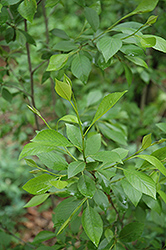September Sun Alder
Alnus maritima 'September Sun'
Height: 20 feet
Spread: 15 feet
Sunlight:
![]()
![]()
Hardiness Zone: 4
Other Names: Oklahoma Alder, Seaside Alder, Beach Alder
Description:
Quite unlike the species this variety forms a compact tree, but fills out quickly and has dense foliage; a good general purpose landscape tree with good fall color; tolerant of ocean spray and salt, ideal for seaside plantings
Ornamental Features
September Sun Alder is primarily valued in the landscape for its distinctively pyramidal habit of growth. It features subtle orange catkins hanging below the branches from late summer to early fall. It has forest green deciduous foliage. The oval leaves turn an outstanding orange in the fall.
Landscape Attributes
September Sun Alder is a dense multi-stemmed deciduous tree with a distinctive and refined pyramidal form. Its average texture blends into the landscape, but can be balanced by one or two finer or coarser trees or shrubs for an effective composition.
This is a relatively low maintenance tree, and is best pruned in late winter once the threat of extreme cold has passed. It has no significant negative characteristics.
September Sun Alder is recommended for the following landscape applications;
- Shade
- Vertical Accent
Planting & Growing
September Sun Alder will grow to be about 20 feet tall at maturity, with a spread of 15 feet. It has a low canopy with a typical clearance of 2 feet from the ground, and is suitable for planting under power lines. It grows at a fast rate, and under ideal conditions can be expected to live for 40 years or more.
This tree does best in full sun to partial shade. It is quite adaptable, prefering to grow in average to wet conditions, and will even tolerate some standing water. It is not particular as to soil type or pH, and is able to handle environmental salt. It is highly tolerant of urban pollution and will even thrive in inner city environments. This is a selection of a native North American species.
